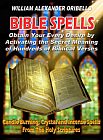|
Spirituality-Religions
Religious Research
|
Bestsellers
Religious Research
Products
- per page
"Reasoning" is defined as: "The act, process or art of exercising the faculty of reason; the act or faculty of employing reason in argument; argumentation, ratiocination; reasoning power; disputation, discussion, argumentation." Stewart says: "The word reason itself is far from being precise in its meaning. In common and popular discourse it denotes that power by which we distinguish truth from falsehood, and right from wrong, and by which we are enabled to combine means for the attainment of particular ends."
Now it is indeed curious how few maxims have ever been written. Wisdom has been extolled on the house-tops, but her practical advice seems to have been kept secret.
The invention of the Alphabet is generally admitted to be one of the very greatest scientific human achievements. It enables civilized men by an easy system of some twenty four or so sound-sings or letter to rapidly express and register their thoughts and speak through time and space, conduct their everyday business by registers and correspondence, and chronicle their experience for the use of future generations by permanent records.
The invention of the Alphabet is generally admitted to be one of the very greatest scientific human achievements. It enables civilized men by an easy system of some twenty four or so sound-sings or letter to rapidly express and register their thoughts and speak through time and space, conduct their everyday business by registers and correspondence, and chronicle their experience for the use of future generations by permanent records.
The origin of the Semitic Deluge story.
This study of our subtle body is based on the works of Theosophical authors and noted clairvoyants, including H. P. Blavatsky, C. W. Leadbeater, and Annie Besant. The astral body is the vehicle of feelings and emotions seen by clairvoyants as an aura of flashing colors.
THOUGH for the most part entirely unconscious of it, man passes the whole of his life in the midst of a vast and populous unseen world. During sleep or in trance, when the insistent physical senses are for the time in abeyance, this other world is to some extent open to him, and he will sometimes bring back from those conditions more or less vague memories of what he has seen and heard there.
Many able and cultured writers have delighted to expatiate on the beauties of Milton's 'Paradise Lost,' and to linger with admiration over the lofty utterances expressed in his poem. Though conscious of his inability to do justice to the sublimest of poets and the noblest of sciences, the author has ventured to contribute to Miltonic literature a work which he hopes will prove to be of an interesting and instructive character.
Why should an astronomer write a commentary on the Bible Because commentators as a rule are not astronomers, and therefore either pass over the astronomical allusions of Scripture in silence, or else annotate them in a way which, from a scientific point of view, leaves much to be desired.
Why should an astronomer write a commentary on the Bible? Because commentators as a rule are not astronomers, and therefore either pass over the astronomical allusions of Scripture in silence, or else annotate them in a way which, from a scientific point of view, leaves much to be desired.
All very ancient legend and the most rudimentary history, the vague allusions of Plato, Aristotle and Seneca, speak of a country in the Western Ocean, which would scarcely be likely to be the distant Americas; and I think we may accept those legends as to a land existing in what is now the Atlantic Ocean at about the period discussed, remembering that after all legend is oral history and starts with some foundations.
The word Atrahasis means "extra wise" and refers to the earliest known version of Noah, who built an ark and saved mankind from destruction. This is that story, from ancient Sumeria, which many scholars believe was the original from which all known flood stories came from. This was the most popular story in the ancient world and has survived for over five thousand years.
THE books of this author, that are already published, declare sufficiently the high worth of his deep writings: But of all the benefits that do accrue thereby it is one inestimable excellency of them that they help the minds of all sorts of people, that will take pains to read and consider them, in the understanding of the holy Scriptures: and that satisfactorily and convincingly, without need of any reference to the vast commentaries of authors, either in the learned or modern tongues.
- per page





























